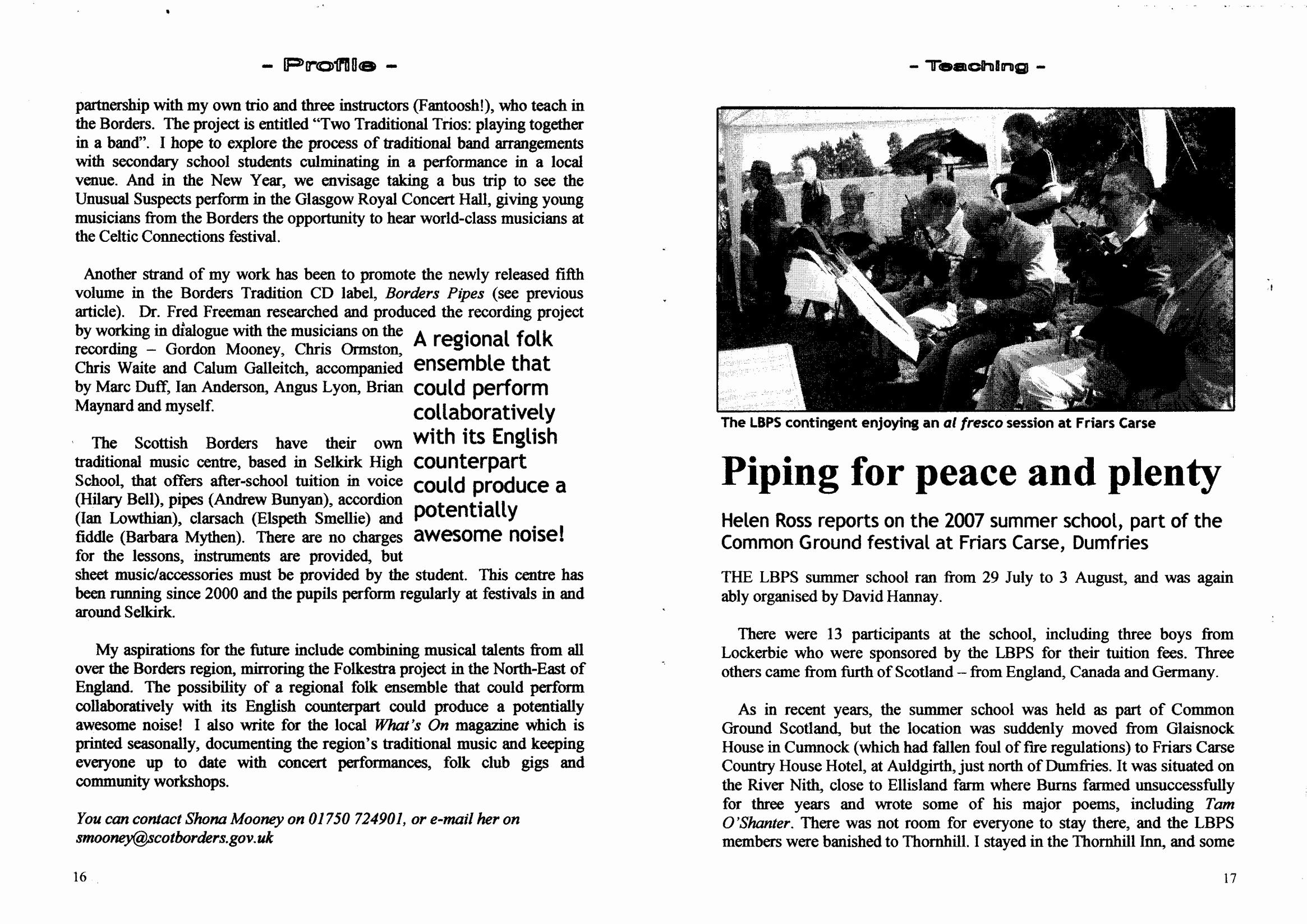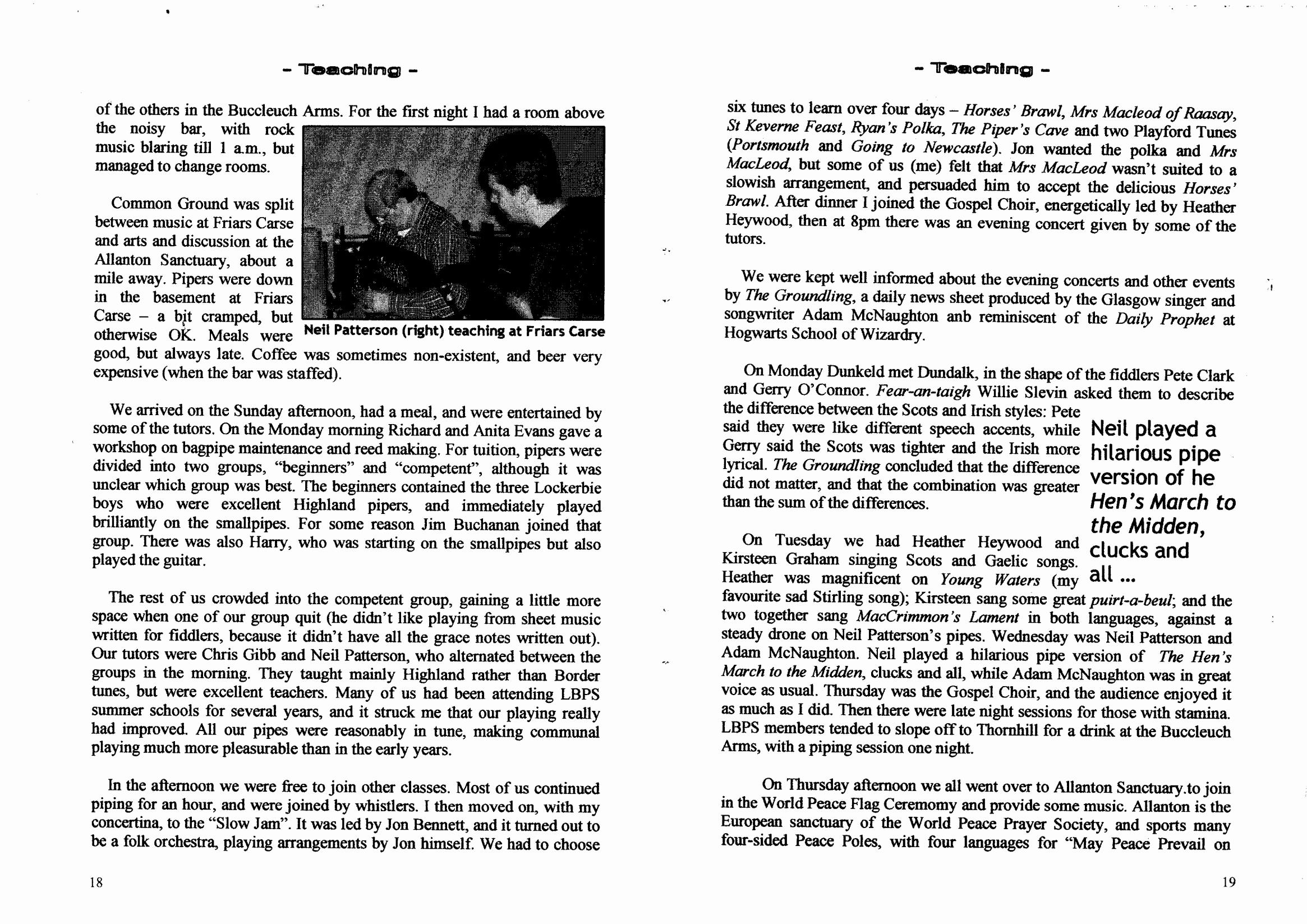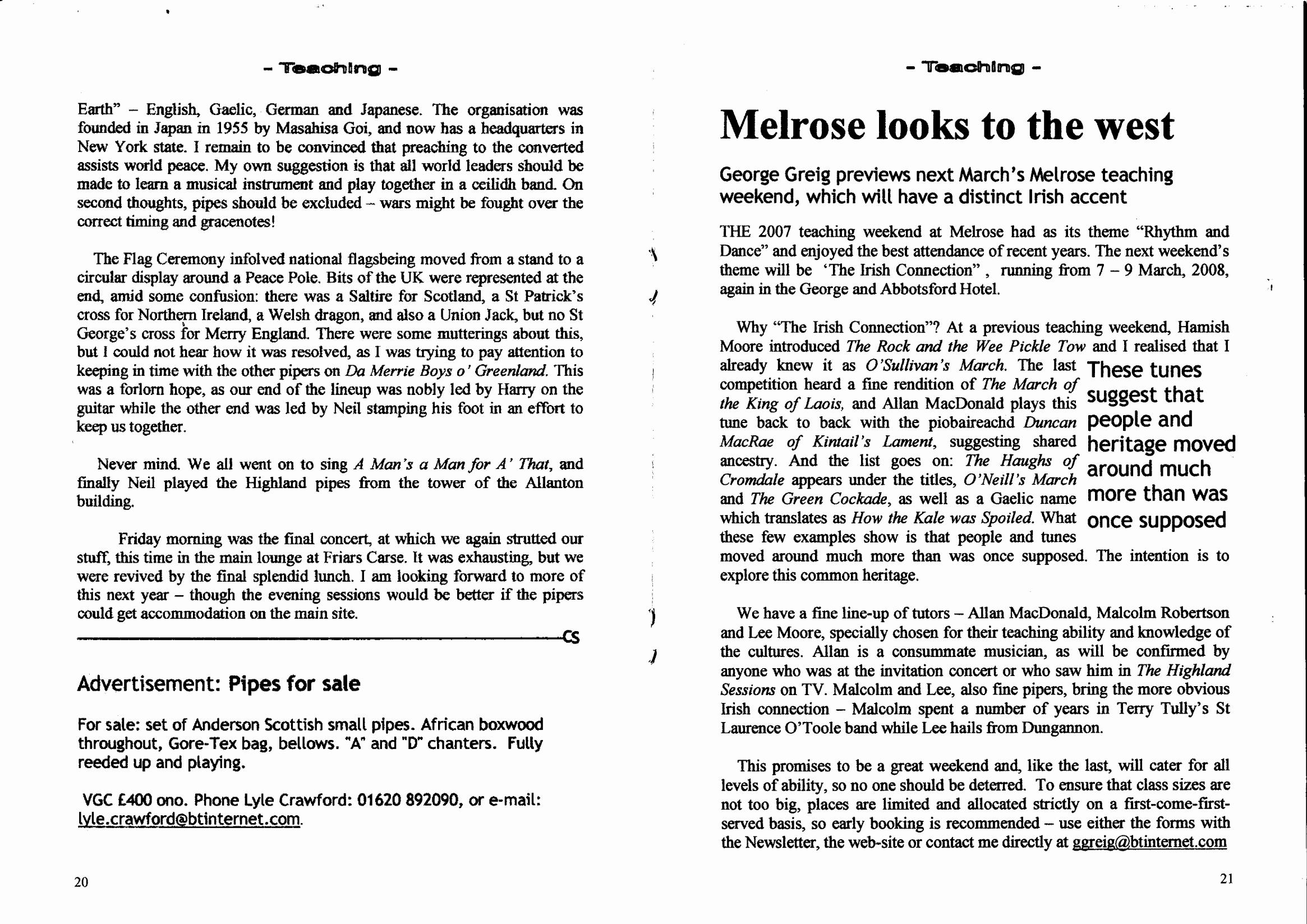Summer School, Common Ground, 2007



Piping for peace and plenty
Helen Ross reports on the 2007 summer school, part of the Common Ground festival at Friars Carse, Dumfries
THE LBPS summer school ran from 29 July to 3 August, and was again ably organised by David Hannay.
There were 13 participants at the school, including three boys from Lockerbie who were sponsored by the LBPS for their tuition fees. Three others came from furth of Scotland - from England, Canada and Germany.
As in recent years, the summer school was held as part of Common Ground Scotland, but the location was suddenly moved from Glaisnock House in Cumnock (which had fallen foul of fire regulations) to Friars Carse Country House Hotel, at Auldgirth, just north of Dumfries. It was situated on the River Nith, close to Ellisland farm where Burns farmed unsuccessfully for three years and wrote some of his major poems, including Tam O'Shanter. There was not room for everyone to stay there, and the LBPS members were banished to Thornhill. I stayed in the Thornhill Inn, and some of the others in the Buccleuch Arms. For the first night I had a room above the noisy bar, with rock music blaring till 1 a.m., but I managed to change rooms.
Common Ground was split between music at Friars Carse and arts and discussion at the Allanton Sanctuary, about a mile away. Pipers were down in the basement at Friars Carse,
- a bit cramped, but otherwise OK. Meals were good, but always late. Coffee was some- times non-existent, and beer very expensive (when the bar was staffed).
We arrived on the Sunday afternoon, had a meal, and were entertained by some of the tutors. On the Monday morning Richard and Anita Evans gave a workshop on bagpipe maintenance and reed making. For tuition, pipers were divided into two groups, “beginners” and “competent”, although it was unclear which group was best. The beginners contained the three Lockerbie boys who were excellent Highland pipers, and immediately played brilliantly on the smallpipes. For some reason Jim Buchanan joined that group. There was also Harry, who was starting on the smallpipes but also played the guitar.
The rest of us crowded into the competent group, gaining a little more space when one of our group quit (he didn't like playing from sheet music written for fiddlers, because it didn't have all the grace notes written out). Our tutors were Chris Gibb and Neil Patterson, who alternated between the groups in the morning. They taught mainly Highland rather than Border tunes, but were excellent teachers. Many of us had been attending LBPS summer schools for several years, and it struck me that our playing really had improved. All our pipes were reasonably in tune, making communal playing much more pleasurable than in the early years.
In the afternoon we were free to join other classes. Most of us continued piping for an hour, and were joined by whistlers. I then moved on, with my concertina, to the “Slow Jam”. It was led by Jon Bennett, and it turned out to be a folk orchestra, playing arrangements by Jon himself. We had to choose six tunes to learn over four days - Horses’ Brawl, Mrs Macleod of Raasay, St Keverne Feast, Ryan’s Polka, The Piper’s Cave and two Playford Tunes (Portsmouth and Going to Newcastle). Jon wanted the polka and Mrs MacLeod, but some of us (me) felt that Mrs MacLeod wasn't suited to a slowish arrangement, and per- suaded him to accept the delicious Horses’ Brawl. After dinner I joined the Gospel Choir, energetically led by Heather Heywood, then at 8pm there was an evening concert given by some of the tutors.
We were kept well informed about the evening concerts and other events by The Groundling, a daily news sheet produced by the Glasgow singer and songwriter Adam McNaughton and reminiscent of the Daily Prophet at Hogwarts School of Wizardry.
On Monday Dunkeld met Dundalk, in the shape of the fiddlers Pete Clark and Gerry O'Connor. Fear-an-taigh Willie Slevin asked them to describe the difference between the Scots and Irish styles: Pete said they were like different speech accents, while Gerry said the Scots was tighter and the Irish more lyrical. The Groundling concluded that the difference did not matter, and that the combination was greater than the sum of the differ- ences.
On Tuesday we had Heather Heywood and Kirsteen Graham singing Scots and Gaelic songs. Heather was magnificent on Young Waters (my favourite sad Stirling song); Kirsteen sang some great puirt-a-beul, and the two together sang MacCrimmon’s Lament in both languages, against a steady drone on Neil Patterson's pipes. Wednesday was Neil Patterson and Adam McNaughton.
Neil played a hilarious pipe version of The Hen’s March to the Midden, clucks and all, while Adam McNaughton was in great voice as usual. Thursday was the Gospel Choir, and the audience enjoyed it as much as I did. Then there were late night sessions for those with stamina. LBPS members tended to slope off to Thornhill for a drink at the Buccleuch Arms, with a piping session one night.
On Thursday afternoon we all went over to Allanton Sanctuar to join in the World Peace Flag Ceremony and provide some music. Allanton is the European sanctuary of the World Peace Prayer Society, and sports many four-sided Peace Poles, with four languages for “May Peace Prevail on Earth” - English, Gaelic, German and Japanese. The organisation was founded in Japan in 1955 by Masahisa Goi, and now has a headquarters in New York state. I remain to be convinced that preaching to the converted assists world peace. My own suggestion is that all world leaders should be made to learn a musical instrument and play together in a ceilidh band. On second thoughts, pipes should be excluded - wars might be fought over the correct timing and gracenotes!
The Flag Ceremony involved national flags being moved from a stand to a circular display around a Peace Pole. Bits of the UK were represented at the end, amid some confusion: there was a Saltire for Scotland, a St Patrick's cross for Northern Ireland, a Welsh dragon, and also a Union Jack, but no St George's cross for Merry England. There were some mutterings about this, but I could not hear how it was resolved, as I was trying to pay attention to keeping in time with the other pipers on Da Merrie Boys o’ Greenland. This was a forlorn hope, as our end of the lineup was nobly led by Harry on the guitar while the other end was led by Neil stamping his foot in an effort to keep us together.
Never mind. We all went on to sing A Man’s a Man for A’ That, and finally Neil played the Highland pipes from the tower of the Allanton building.
Friday morning was the final concert, at which we again strutted our stuff, this time in the main lounge at Friars Carse. It was exhausting, but we were revived by the final splendid lunch. I am looking forward to more of this next year - though the evening sessions would be better if the pipers could get accommodation on the main site.
